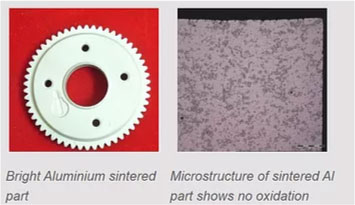


Sintering of Aluminium is challenging. The adherent oxide layer on aluminium particles make sintering impossible unless overcome by the addition of magnesium.
As the free energy formation of MgO is lower than Al2O3, it acts as a solid reductant leading to the formation of non-uniform liquid fraction which causes dimensional & property deterioration.
To successfully sinter Aluminium there needs to be almost no oxygen in the sintering atmosphere and absolutely no hydrogen (complete dewaxing).
A low sintering temperature causes insufficient liquid phase to wet the particles. A high sintering temperature increases the liquid volume fraction and the grain size and also reduces mechanical properties. Maintaining the correct sintering temperature within a narrow tolerance is required to optimize the liquid phase for obtaining the highest sintered density and the best mechanical properties.

Complete dewaxing before sintering to remove all hydrocarbons; results in absolutely no hydrogen in sintering zone
Atmosphere lock chamber between debinding and sintering zones prevent hydrogen and carbon from entering sintering chamber
Atmosphere purge locks at entry and exit ensure that air does not enter the furnace
High atmosphere purity; oxygen <5 ppm & dew point <(-) 70 °C)
All metal muffle (with heaters within muffle) to eliminate contact of the atmosphere gas with the refractory
High temperature atmosphere uniformity (ΔT < 4°C) throughout the furnace; optimizes liquid phase to attain highest sintered density & desired mechanical properties
Recirculating fans & baffles provide jet impingement on the parts for rapid heat transfer
All Fluidtherm furnaces are fully automated